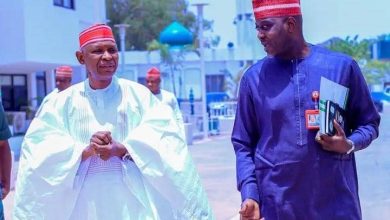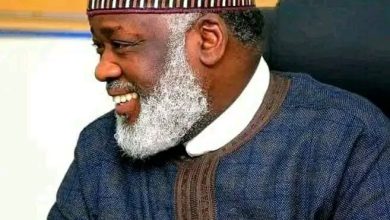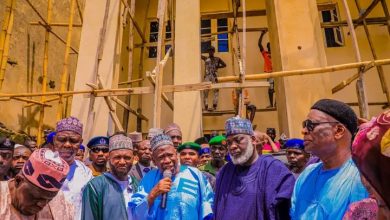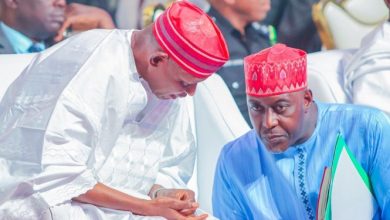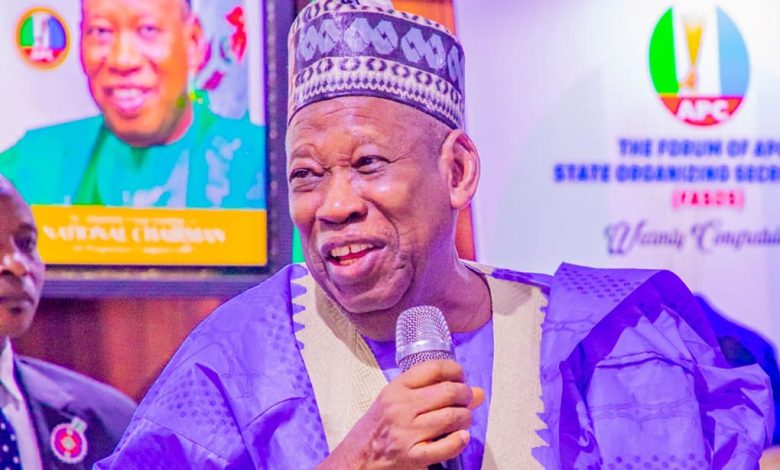
The resignation of Dr. Abdullahi Umar Ganduje as National Chairman of the All Progressives Congress (APC) on June 27, 2025, came as a surprise to many. What made it more striking was the fact that Ganduje stepped down at a time when the APC was gaining unprecedented momentum, consolidating strength, expanding its base, and winning key political battles across the country.
Ganduje’s impact on the APC goes beyond internal reconciliation or party restructuring. He turned a once troubled platform into a strategic, results-driven machine ready for dominance in the 2027 general elections.
When Ganduje assumed office as APC Chairman on August 3, 2023, the party was riddled with internal divisions and post-election cracks, especially following the fiercely contested 2023 general elections that brought in President Bola Ahmed Tinubu. In many states, APC structures were weak, disjointed, or even defunct.
Related:
Ganduje Bows Out with Legacy of Political Impact, Party Growth, and National Reach
Ganduje brought a different energy. With the poise of a seasoned administrator and the grit of a political tactician, he immediately began repairing fractures across party lines. He led reconciliation efforts nationwide, calming aggrieved factions and uniting leaders under a renewed sense of purpose. In record time, the APC transformed from disarray to discipline.
One of the most remarkable aspects of Ganduje’s tenure was the wave of high-profile defections that bolstered the APC’s ranks. Two sitting governors, Sheriff Oborevwori of Delta and Umo Eno of Akwa Ibom crossed over to the ruling party along with their deputies and cabinet members, a move that significantly weakened the opposition.
Perhaps the most symbolic political coup under his leadership was the defection of Ifeanyi Okowa, former Delta State Governor and PDP’s 2023 vice-presidential candidate. Okowa came with his full political structure, signaling that Ganduje’s leadership wasn’t just attractive, but convincing.
Several other political heavyweights followed suit, including former Deputy Senate President Ovie Omo-Agege, Senator Ned Nwoko, and Chiedu Ebie, Chairman of the NDDC Governing Board. These weren’t mere defections; they were strategic wins.
Read Also:
Things to Know About Dr. Asiya Ganduje, Director of Community and Rural Development NWDC
Back in his home state of Kano, Ganduje managed to sway several key figures from the ruling NNPP to the APC. These included Senator Abdurrahman Kawu Sumaila, former House Speaker Kabiru Alhassan Rurum, former SSG Dr. Baffa Bichi, and federal lawmakers from Rano/Bunkure/Kibiya and Karaye/Rogo constituencies. His grassroots engagement reshaped the APC’s structure in the North.
In Kebbi State, Ganduje’s influence was again on full display when three serving PDP senators Adamu Aliero, Yahaya Abdullahi, and Garba Maidoki defected to the APC under his guidance.
As party leader, Ganduje helped the APC secure victories in several key off-cycle elections. The party clinched governorship wins in Kogi, Imo, Bayelsa, Edo, and Ondo states where the opposition had long held sway.
Edo State witnessed a political earthquake with mass defections from the PDP to the APC, including Speaker Blessing Agbebaku and several state lawmakers and senior party officials such as Roland Asoro, Nosa Nosayaba, and Gabriel Oloruntoba.
His ability to attract not only individuals but entire political structures was further demonstrated by the defection of figures like Prof. Rufai Alkali, former NNPP chairman; Senator Suleiman Hunkuyi; Prof. Ben Angwe; Senator Ifeanyi Ubah from YPP; and Senator Uche Ekwunife.
Beyond politics, Ganduje left a policy legacy. Under his chairmanship, the APC launched The Progressive Institute (TPI), a think tank and policy hub designed to support good governance, political education, and youth inclusion. For the first time, a political party in Nigeria institutionalized its ideological training arm.
According to Ganduje, the purpose of TPI was “to enhance the policy capacity of the party and provide guidance to APC-led governments.” The initiative also focused on nurturing a new generation of leaders aligned with the party’s progressive ideology.
Ganduje’s leadership has not only stabilized the APC but set it on a clear path to victory in 2027. By rebuilding internal cohesion, orchestrating strategic defections, and strengthening grassroots presence, he turned the APC into an electoral powerhouse.
His resignation may mark the end of an era, but his legacy is firmly rooted in the political architecture of the APC. History will remember Dr. Abdullahi Umar Ganduje as the strategist who transformed a party in turmoil into a winning machine, one battle, one state, and one strategy at a time.
Umar Idris Shuaibu is a Ganduje stalwart and writes from Kano.
shuaibuumaridris@gmail.com
